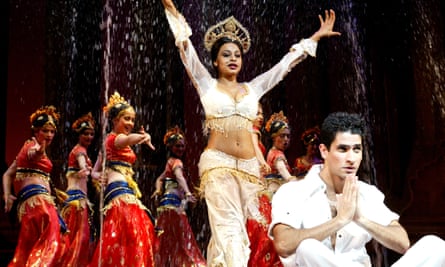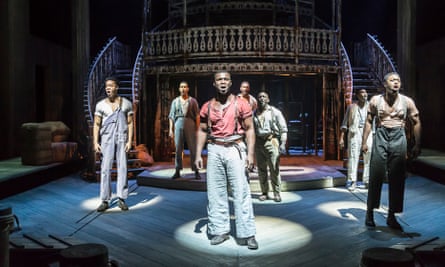Andrew Lloyd Webber has said he fears for the survival of British theatre unless it reflects the diversity of the nation’s population, referring to the industry as still ‘hideously white’.
The award-winning composer of hits including Evita, Cats and Jesus Christ Superstar sounds the warning in a diversity report he commissioned to address the lack of non-white performers and backstage staff.
In its introduction, he writes: “I passionately believe that the stage needs to reflect the diversity of the UK population or it risks becoming sidelined.”
The report, published on Thursday, warns: “If the situation continues, there is real danger that, not only will black and Asian young people stay away from the theatre as a profession, they will stay away as punters. And without them in the audience, theatres will become unsustainable, as they are forced to compete for a dwindling ageing, white, middle-class audience.”
The report was commissioned earlier this year by the philanthropic Andrew Lloyd Webber Foundation to explore the absence of black, Asian and minority ethnic (BAME) people in live theatre. The composer’s casting director, David Grindrod, has said “a vast majority” of those who audition for UK productions are “white middle class”.
Lord Lloyd-Webber said he was alarmed by the findings of the report, Centre Stage: The Pipeline of BAME Talent. He is calling for “arts sector bodies, drama schools, theatre producers, actors, creative teams and philanthropists to take responsibility and specific action” to ensure that BAME people are given the chance to take centre stage within the industry.
The report’s authors, Danuta Kean, an arts, media and publishing analyst, and Mel Larsen, an arts consultant, say “white middle classes still dominate audiences” and that “even in London, where the BAME population is now 44%, audiences outside specialist theatres and theatre groups remain overwhelmingly white”.

Lamenting a tendency for black and Asian actors to get “secondary roles as hoods, hoodlums and hookers”, they call for action to ensure such talent is no longer marginalised.
They say the odds are “stacked against minorities in a profession where the default lead is white unless specifically written for a black or Asian actor”.
Their research claims “representation of minority ethnic actors is as low as one student a year in some drama colleges”, while there are “far fewer opportunities for career-changing lead roles” for them.
The report covers theatre across the board. It says “musical theatre has challenged the monoculture”, with successful productions such as Motown the Musical, “but the success of these shows has bred another problem. The failure of drama schools to take in enough BAME talent has led to a shortage of actors suitable for the roles and, as a result, touring productions have been cancelled”.
The findings tally with Lloyd Webber’s own experience. In the introduction to the report, he recalls: “When I produced Bombay Dreams over a decade ago and was privileged to introduce the marvellous music of AR Rahman to a West End audience, one of our greatest difficulties was finding enough Asian actors.”
He says BAME diversity in the performing arts has been high on the agenda this year, notably with “the runaway success” of the US musical Hamilton – a Broadway hit that will transfer to the West End and which was created and performed by an almost entirely non-white company. He also notes Arts Council England’s £4.6m funding to boost diversity.
But, he says: “Very often the discussion is focused on increasing the representation of diverse ethnicities on stage.” While saying this is crucially important, he adds: “I’ve been acutely aware that one of the biggest issues is the lack of trained diverse talent coming through. Casting directors and theatre producers alike often complain that they’d like to cast more BAME performers, but that they don’t get enough turning up to audition.”
He pays tribute to some of the success stories coming out of his foundation’s scholarship programme, including Emmanuel Kojo, an actor of Ghanaian heritage. Kojo spoke to the report’s authors after receiving a best supporting performance nomination in the UK Theatre Awards for his part in Show Boat at Sheffield’s Crucible theatre. He told them that equality and diversity on the UK stage will only exist when people stop referring to him as a “black actor”: “I have always just thought of myself as an actor but, since starting in this profession, I have been made aware that I am a black actor. We won’t be equal until there is no prefix when people talk about us.”

The report says the problem is even greater backstage, with only a handful of BAME senior executives, while makeup artists are not trained to deal with black skin.
Among the recommendations are calls for producers, directors and others to “take a lead in encouraging a more culturally diverse workforce”, with “colour blind” casting and more plays by BAME writers.
It also urges drama schools to make 50% of their places accessible to students from low-income backgrounds and for funding bodies such as Arts Council England to offer resources and initiatives to ease the BAME path into the theatre.
Kean said specific data on black and Asian actors appearing in the West End proved “impossible to get”. Precise figures for the ethnic breakdown of audiences do not exist, she said, because “there’s an assumption that black and Asian people don’t go to the theatre”.
She added: “Companies like Curve [theatre] in Leicester show that that’s completely not true … There’s a complete failure to acknowledge the mix of audiences.”

In the report, Curve’s associate director, Suba Das, talks of “a ghettoised perception of what diversity looks like in this country … because a lot of the gatekeepers think only of the lower economic groups”. He adds: “I have lost count of BAME actors and directors who have told me that they have said to agents and directors they are great at Shakespeare, but instead they are told they need to ‘develop a London accent’ if they are to get work.”
An unnamed East Asian actor – who is Oxford educated – says that, while white actors are auditioned according to their suitability for a role, casting directors expect actors of colour to represent the perceived “oppression” of their race – whatever the actor’s background. “I have been to auditions where I have felt that the director wanted to establish whether I had ‘suffered enough’ and to prove my class credentials,” the actor said.
Other productions that have bucked the trend include Dreamgirls, The Scottsboro Boys and Thriller Live. Kean said musical theatre in particular was challenging the monoculture. She applauded Opera North’s touring production of Kiss Me Kate, which starred Kojo in a role normally given to “a default white actor”.

Comments (…)
Sign in or create your Guardian account to join the discussion